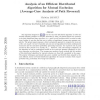Free Online Productivity Tools
i2Speak
i2Symbol
i2OCR
iTex2Img
iWeb2Print
iWeb2Shot
i2Type
iPdf2Split
iPdf2Merge
i2Bopomofo
i2Arabic
i2Style
i2Image
i2PDF
iLatex2Rtf
Sci2ools
CONPAR
1992
1992
Analysis of an Efficient Distributed Algorithm for Mutual Exclusion (Average-Case Analysis of Path Reversal)
The algorithm designed in [12, 15] was the very first distributed algorithm to solve the mutual exclusion problem in complete networks by using a dynamic logical tree structure as its basic distributed data structure, viz. a path reversal transformation in rooted n-node trees; besides, it was also the first one to achieve a logarithmic average-case message complexity. The present paper proposes a direct and general approach to compute the moments of the cost of path reversal. It basically uses one-one correspondences between combinatorial structures and the associated probability generating functions: the expected cost of path
CONPAR 1992 | Distributed And Parallel Computing | Logarithmic Average-case Message | Path Reversal | Path Reversal Transformation |
| Added | 09 Aug 2010 |
| Updated | 09 Aug 2010 |
| Type | Conference |
| Year | 1992 |
| Where | CONPAR |
| Authors | Christian Lavault |
Comments (0)

